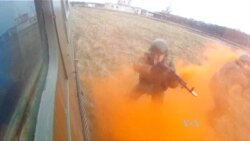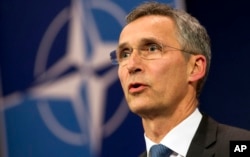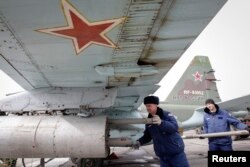Russian Foreign Minister Sergei Lavrov met Friday with the head of NATO, Jens Stoltenberg, on the sidelines of a security conference in Munich, after the Western military alliance and the United States announced plans for the biggest military buildup in Europe since the Cold War.
Russia's TASS state news agency quoted Deputy Russian Foreign Minister Alexei Meshkov as confirming that during the meeting, Lavrov expressed concern about the Western military alliance's plans to strengthen its presence on Russia's borders.
Earlier Friday, Russian news agencies quoted Meshkov as saying that Lavrov and Stoltenberg discussed holding a meeting of the Russia-NATO Council, but agreed that the agenda for the meeting still needs to be worked out.
NATO said on its website Friday that Stoltenberg and Lavrov "reviewed NATO-Russia relations and agreed to continue exploring the possibility of a NATO-Russia Council meeting."
The United States is planning to quadruple military spending in Europe to $3.4 billion in 2017 as NATO increases troops on rotation and training, stockpiles military hardware and arms, and forms a rapid reaction force.
Russia has called NATO's moves a threat to stability in Europe. The military alliance says the news plans are aimed at reassuring eastern European allies concerned about Russian aggression.
Russia's military went on high alert and held snap drills in central and southern Russia near Ukraine as NATO defense ministers gathered in Brussels this week to hammer out steps to defend the Baltics and Eastern Europe.
"NATO defense ministers agreed on an enhanced forward presence in the eastern part of our alliance,” said Stoltenberg. “This will be multinational, to make clear that an attack against one ally is an attack against all allies, and that the alliance as a whole will respond."
Russian state media described the NATO plan as saber-rattling.
Russia's Foreign Ministry called it a design to contain Russia and a threat to Europe.
"We do not understand what triggered those actions,” said spokeswoman Maria Zakharova. “We believe that they threaten not Russia itself but the strategic stability and security expected to prevail in Europe."
Russia’s envoy to NATO promised a military-technical response to the alliance's increased presence in Europe.
But Russian political analysts say they are not worried about a renewed arms race as NATO acts as a deterrent and poses little threat to nuclear-armed Russia.
“I think the expansion of NATO itself is more a geopolitical challenge to Russia because, this means the expansion of the U.S.-led alliance, zone of influence,” said Carnegie Moscow Center Director Dmitri Trenin. “Russians would say a zone of security. Others would say a zone of protection.”
Cynical Russians see the threat label as mutually beneficial to military budgets. "It's the mirror image for the Russian authorities,” said construction director Yakov Zaichik. “Now, the Russian authorities will use the situation to expand their forces, gain some experience, and for their election benefits.”
But most Russians echo the official line repeated on state television.
"I think the encroachment of a border is always a threat,” said engineer Yury Semonov. “Russia's not moving in on anybody's borders."
NATO limited relations with Moscow after Russian forces annexed Ukraine's Crimean peninsula and began supporting pro-Russia rebels in eastern Ukraine.
Russia's military posturing and probing of its neighbors since has increased concerns about its intentions. NATO says Russian military jets have been turning off their transponders, skirting borders, and coming dangerously close to other airplanes. Moscow denies any aggression.
NATO is reinstituting ambassador-level talks at the NATO-Russia Council, which was frozen in 2014, to increase transparency and prevent misunderstandings.
"It's something which we have used only sporadically and allies believe that it's a right time to perhaps try again,” said the Brussels-based Acting Head of the NATO Information Office in Moscow Robert Pszczel. “But, it does not mean a return full cooperation at this stage and it does not mean that we are establishing a new institution,” he added.
Tensions between Russia and NATO are not expected to ease until there is substantial progress on implementing Ukraine’s peace deal, the Minsk agreement.
“The sooner the Ukrainian crisis will be settled, the better,” said Retired Lieutenant-General Evgeny Buzhinsky at the Russian Center for Policy Studies. “That's the core of our disagreements and actually the basis of, I do (am) not afraid to use the word, confrontation.”
In the most serious incident since the Cold War, jets of NATO member Turkey in November shot down a Russian military plane along its border with Syria. Ankara says the Russian bomber ignored warnings and, as in previous incidents, crossed over the Turkish border. Moscow denied the bomber left Syrian airspace and called the downing a planned provocation.
NATO said Russia's continued air strikes in Syria since September in support of the Syrian government are undermining peace efforts, a charge Russia rejects.
In a sign of progress in Syria, Lavrov and U.S. Secretary of State John Kerry announced a cease-fire and humanitarian aid plan Thursday to take effect within a week.
Mark Grinberg contributed to this report.







